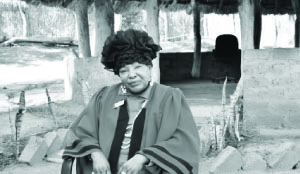By MWANGALA LISELI –
Today, in Zambia after 50 years of independence, some people still use the bush to answer the call of nature, especially in rural areas, a situation experts refer to as open defecation.
The situation is not only common in rural areas but also in urban areas, especially in townships where there are some shrubs.
Statistics show that about 50 per cent of Zambians are without access to good sanitation.
This scenario promotes the spread of infections due to lack of sanitation facilities thus contributing to the disease burden.
Chieftainess Mwenda’s area in Chikankata, Southern Province was one of the places where open defecation was rife hence the move by WASH a USAID project aimed at promoting sanitation and hygiene.
Chikankata District is one of the beneficiaries of this programme as it has attained the programme’s main goal of being open defecation free.
The WASH network programme is making great impact on lives of the people, especially in rural areas by fighting open defecation.
The network programme has been sensitising people on the dangers of open defecation and encouraging the building of lavatories as well as the importance of hand washing.
Chieftainess Mwenda of Chikankata says her area is almost an open defecation free area because of the sensitisation that was carried.
Some headmen who were educated later trained their people on the importance of good sanitation and hygiene.
Senior headman of Mahule, Geoffrey Makoli says his area achieved the status recently after encouraging his people and teaching them the importance of using a lavatories and hand washing with soap or ashes which acts as disinfectants.
“I have 20 Sanitation action group (SAG) members and 10 junior headmen who conduct door to door checks and continue sensitising the community on the importance of having lavatories and hand washing facilities,” he says.
Being a hilly and wide land with fewer trees because most have been cleared for farming, one can hardly use a bush without been spotted.
This has also limited the community from using the bush and has forced them to build toilets to save themselves from embarrassment.
Chikankata district Environmental Health Technologist Mbanga Litiya, says the district has been working hard to ensure there is total hygiene and sanitation in the district.
Mr Litiya, however, hand washing was still challenge despite having built some lavatories.
This network program had also been extended to schools in the district where teachers too had been trained to build enough lavatory and hand washing facilities.
Elizabeth Habeenzu One of the beneficiaries of the programme says having a lavatory and hand washing facility has improved sanitation and hygiene in her household.
Before the programme was introduced, she and her family used the bush to answer the call of nature which was risky and embarrassing.
“Before we had a lavatory, we used the bush but it was dangerous because anything could happen to us and it was also easy to catch a disease or been seen by others,” she says
“Having a lavatory has made my family’s life easy because we don’t have to look for a bush anymore and we also have learned to wash our hands after using it because the washing facility is just outside the lavatory.”
Ms Habeenzu said the WASH programme has empowered her with knowledge that she even educates other women in the community on the best sanitation hygiene practices.
She has also learnt how to manage solid waste materials.
The media has been instrumental in realising the objective of open defecation free area and promoting sanitation and hygiene.
Chikankata radio is the only community radio in the district and is run by the Salvation Army church spreading the Gospel of the Bible to its listeners.
The radio has played a role of educating the masses not only in Chikankata but also the neighbouring districts such as Pemba and Monze.
Chikankata radio station manager Webster Mweemba said the radio runs a programme on sanitation where they air the Mr Litiya who talks about hygiene and shares the benefits of having lavatories and good sanitation.
Mr Mweenba says that the programme which is aired on Monday and Saturday evening allows people to call and share their views and concerns on the programme.
He said this has encouraged people to build lavatories as they have now known that their landscape does not allow open defecation because of its hilly nature which carries waste from the hills down to valley when it rains.
Chieftainess Mwenda commended the station and other media institutions on the good efforts they were making to educate the public on hygiene and sanitation.
In this time and era, it is expected communities have migrated from the ancient ways of living to modern ones







